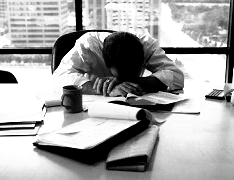Employers told to talk though sickies
 Australian workers are among the world’s most likely to take a sickie, and experts say it could show something deeper about our organisations.
Australian workers are among the world’s most likely to take a sickie, and experts say it could show something deeper about our organisations.
Fiona Hitchiner, a work–life integration specialist, has told Huffington Post reporters that a seemingly innocent sick day could be quite ominous.
“The word sickie reflects a larger trend in the workplace of higher than normal absenteeism,” Hitchiner said.
“It usually points to workload, stress, anxiety, culture within the team, bullying or harassment. Or it could be down to the fact that they’re just not engaged in the type of work.”
“There’s no ‘one size fits all’ issue but it all points to a wider problem.”
She said increased absenteeism should prompt managers to talk with staff about goals and job satisfaction.
“They need to say; ‘I’ve noticed you’ve taken time off. Is everything okay? How’s everything at work? Is there anything I can help you with your workload, or is something going on at home you’d like to talk about?’ Try to find the underlying issue,” she said.
She said disciplinary action for taking regular sick leave should be a last resort.
“Of course there will be the small percentage of people taking sickies as a way of taking the mickey, but employers need to be supporting the majority of people who might have other issues going on,” Hitchener said.
“He or she might be having personal matters outside of work that are affecting their ability to concentrate, or it could the health concern of a loved one.”
“We don’t go to work in a bubble. What impacts us at work impacts us at home and what impacts us at home also impacts us at work. The important thing is to build trust and support in the workplace.”
Psychologist Samantha Symes told reporters that people often take sick leave because they were exhausted.
“Sick leave isn’t always a sign that someone isn’t coping, it’s more a case that people get sick because they haven’t got things in their life to balance out their workload,” Symes said.
“Some people don’t stop and look at how their workload is impacting on them until they’re pushed to the point of collapsing — that’s when they take sick leave.”
“What people need to do is monitor their workload and look at how they can work more productively. Don’t get into a situation where you’re constantly bringing work home with you or staying up late just to clear your inbox.”
“Look at how to maintain a good work/life balance rather than waiting until you’re so exhausted you need to take sick leave. Don’t make work a priority over your health.”







 Print
Print